- 22 January 2016
- Magazine
-
(건강) 성형수술은 정말 자신의 몸이 더 이뻐졌다고 느끼게 해주는가?아름다운 인생/건강 2016. 1. 23. 20:25
출처: http://www.bbc.com/news/magazine-35380469
A Point of View: Does cosmetic surgery really make people feel better about their bodies? 성형수술은 자신의 몸이 더 이뻐졌다고 느끼게 해주는가?
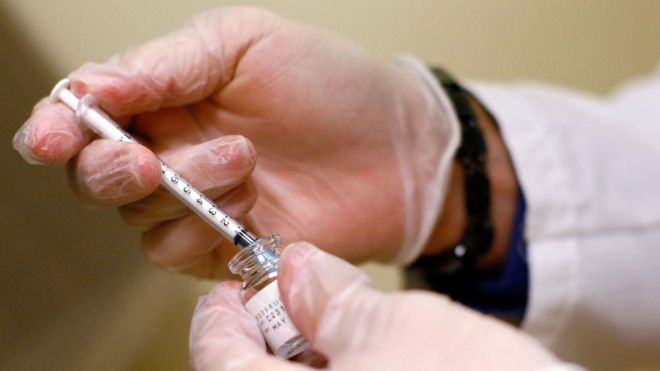 Getty Images
Getty ImagesCosmetic surgery is a booming industry. Tom Shakespeare worries about people's urge to alter their bodies. 성형수술은 잘 나가는 산업이다. 톰 세익스피어는 사람들이 자신의 몸을 바꿔보겠다는 생각에 대해 우려한다.
I don't much look in mirrors. But my friends have hung little looking glasses in their hall, and as I wheel out, I see my face up close. I'm not sure I like those crow's feet that have sprouted at the corner of my eyes. But I don't have to put up with them. Cosmetic surgery is becoming normalised. Year on year, getting "work done" becomes more accessible and more acceptable. In other words, we are becoming normalised, both by delaying the impact of ageing, and by tweaking young bodies into conforming.
In 2002-3, the British Association of Aesthetic Plastic Surgeons carried out 10,700 procedures. Ten years later, they carried out 50,000 procedures of which the most common was breast augmentation. The association's members carry out only about a third of cosmetic procedures in the UK, so the total number is much higher. But even so, we're not in the global premier league of body modification, which is the US, Brazil, Japan and South Korea. In the US, there were more than 10 million cosmetic procedures performed in 2015. one South Korean survey found that more than 60% of women in their late 20s and 40% of women in their early 20s had had a cosmetic procedure.
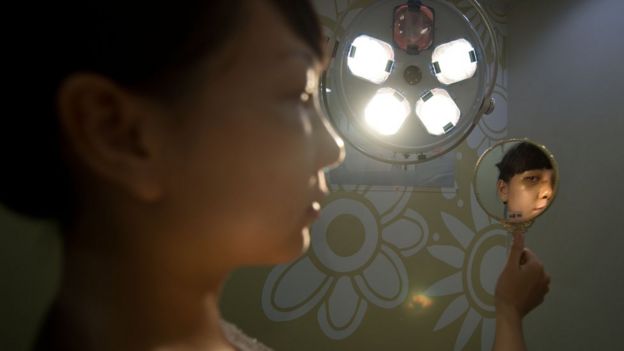 Getty Images
Getty ImagesI've been learning a lot more about all this recently, because I sit on a Nuffield Council on Bioethics working party on cosmetic procedures. The evidence we're receiving is often shocking, and sometimes makes me keep my legs firmly crossed. But more than anything, it saddens me. 너필드 생명윤리위원회
Why are people resorting to cosmetic surgery? There is increasing pressure to look young and beautiful, especially for women, who are still more likely to be judged on appearances, particularly in the workplace. The media is full of makeover programmes glamorising cosmetic surgery and celebrities who look ever more perky. Subliminally and not so subliminally, our culture is changing how humans feel they should look. People believe they will be happier and more successful if they conform more closely to these cultural norms. 부지불식간에
Overall, 85% of people who have cosmetic surgery are women. Most of those women will be trying to appeal to men. So we men must ultimately take the blame. We undermine women's self-esteem. And then we make money out of that dissatisfaction. 성형수술 받는 사람의 85%가 여성이다.
Pornography is now ubiquitous and must be a big driver of people's dissatisfaction with their bodies. Let me give you an example. Ironically, while the UK has banned female genital mutilation, it is simultaneously having a booming trade in labiaplasty. Girls and women, or perhaps their boyfriends and husbands, are seeing women's vulvas in pornography, and going to their doctors to get themselves "tidied up". one gynaecologist told me about the young girl who is brought by her mother. This doctor tells the girl that she has seen thousands of labia, and that this girl is entirely normal. But there is a powerful drive to conform to the pornographic ideal of what women should look like. And when it's a white girl, the law doesn't seem to apply. 포르노가 이제 너무 흔해져서 그런지 이 포르노로 인해 많은 사람들이 자신의 몸에 불만족한다. 예를 하나 들어보자. 아이러니하게도, 영국에선 여성의 성기에 칼대는 것을 금하고 있는데도 불구하고, 음순성형이 잘 나가는 사업이 되었다.
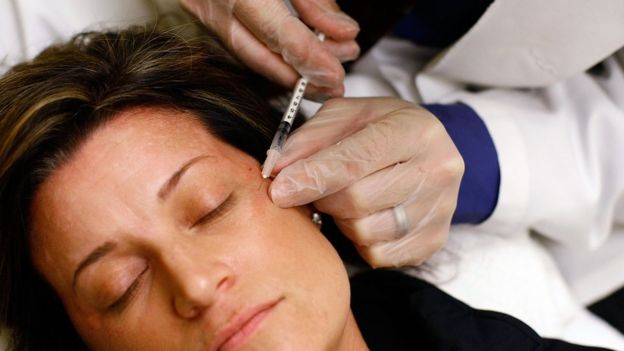 Getty Images
Getty ImagesYou could argue that it's a free country. We have an ethic of individual informed choice in healthcare. If someone has decision-making capacity, and wants to spend their own money on botox injections or removing their man-boobs, then that's up to them. But the effect of many individual choices is to change cultural perceptions for everyone. If most people take surgical routes to delaying the effect of ageing, then we will have different expectations of what we are meant to look like in our later years. 남자인데 여자처럼 큰 가슴.
What is the disability perspective on all this? What happens to the abnormal when the new normal is hyper-normal? Many of us already have faces or bodies that are different from the prevailing norm of beauty. There's even a charity, Changing Faces, which helps people with facial disfigurement and campaigns for greater acceptance. Because of my achondroplasia or dwarfism, I have a big head and chubby arms and legs. Aside from a very tortuous technique called limb-lengthening, there's not much that I can do about it. So if I want to feel good about myself, I have to come to terms with my difference. 연골형성부전증 왜소증.
That's not easy. Like all restricted-growth people, I do get stared at all the time, laughed at regularly, and sometimes taunted.
Plastic surgery
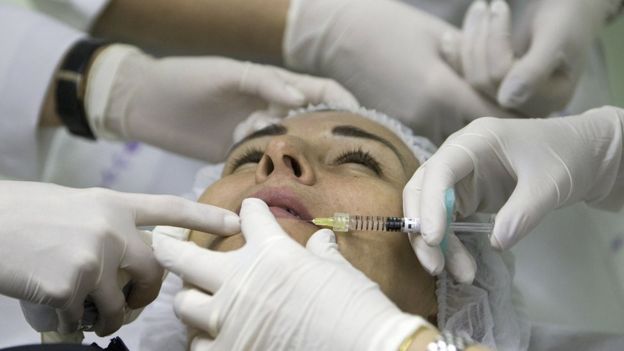 Getty Images
Getty Images- The NHS rarely provides cosmetic surgery
- Popular operations include breast augmentation or reduction, eyelid surgery (blepharoplasty), liposuction, and ear reshaping (otoplasty or pinnaplasty) 인기있는 성형수술에는 유방확대나 축소, 쌍꺼플 수술(眼瞼/눈꺼플 수술), 지방흡입술, 귀모양 새로하기(귀성형이나 귀의 외과적 교정)이 있다.
- Non-surgical treatments include botulinum toxin injections (such as Botox), dermal fillers, chemical peels, microdermabrasion, and laser treatments (such as hair removal) 비성형 시술에는 보툴리눔 독소 주사(보톡스), 피부 메꾸기, 화학적 피부 벗기기, 미세연마술, 레이저시술(예 털제거)이 있다.
- The Ancient Egyptians carried out rhinoplasties (nose jobs) and the Indian physician Sushruta conducted plastic surgery and cataract operations in 6th Century BCE 고대 이집트인들도 코성형(코성형)을 했으며, 인도 의사 Sushruta는 기원후 6세기에 성형수술과 백내장수술을 했었다.
But I have learned that people can still find you attractive, even if you look different. The things that make people like you, and even desire you, are mostly about personality - being emotionally warm, or good at conversation, especially being funny. So maybe disabled people can share these lessons with non-disabled people. In my experience, those disabled people who have successfully come to terms are far less self-conscious about their body. For non-disabled people, the clothed body is a fiction that they present to others. The naked body, without adornment or make-up, is something to be ashamed of. For disabled people, we are always different from the norm. So we have nothing to hide, and no reason to feel embarrassed by undressing. Paradoxically, we may be happier with our seriously flawed bodies than others are with their minor defects.
Surveys show that young people in Britain are increasingly dissatisfied with their bodies. For example, a 2013 survey of Girl Guides' attitudes suggested that a third of 11-21 year olds were unhappy with the way they looked, and more than a quarter would consider cosmetic surgery.
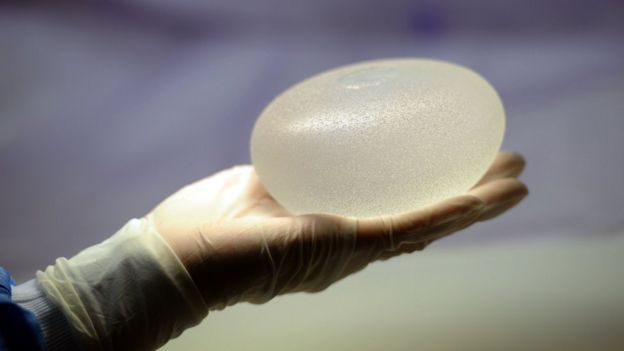 Getty Images
Getty ImagesA silicone breast implant If someone feels unhappy with her body image, should we offer her a surgical fix, or should we help her address her anxieties? If you feel this suggestion is an affront to people's right to do what they like with their bodies, consider this. According to seven epidemiological studies, women who undergo breast enlargement have a suicide rate at two or three times that of the general population. Presumably there is an underlying dissatisfaction which makes some people resort to breast surgery and which the surgery does not solve. There is a known psychological condition called body dysmorphia disorder (BDD), and several studies suggest that about 10% of people who go for cosmetic surgery have this condition. But if you have BDD, cosmetic surgery will be ineffective in making you feel better about your body. According to campaigners, more than 725,000 people in the UK are affected by an eating disorder. one of these conditions, anorexia, has the highest mortality rate of any mental illness. 외과적 교정 상처. 7가지 전염병학 연구. 신경성 식용부진증(거식증)
As well as psychological issues, there are also health issues. Maybe you remember the recent scare about Poly Implant Prothese, where breast implants were filled with the wrong sort of silicone. But there are adverse events associated with many procedures. While cosmetic surgery is mostly conducted in the private sector, correcting complications often generates costs for the NHS.
So it seems to me that it would be preferable to solve the body image problem with psychological and cultural actions, rather than medical or surgical fixes. Rather than normalising cosmetic procedures, maybe we should show many kinds of beauty. Why can't our entertainment, fashion and media explore a wider range of body types? Casting agencies could find models and performers who are young and old, big and skinny, short and tall, different ages, ethnicities and impairments. And men? We should grow up and learn to look beneath the skin.
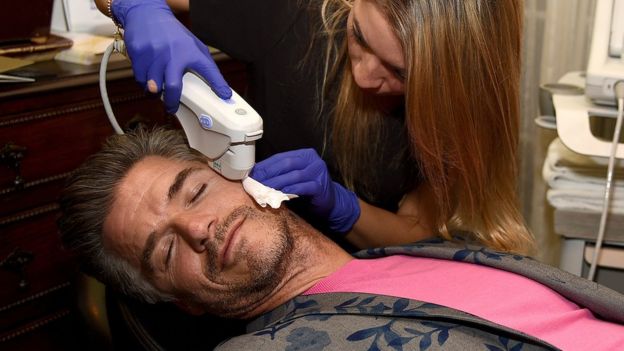 Getty Images
Getty ImagesI'm not trying to judge or criticize the choices of any individual. My anxiety is about the society that first generates body dissatisfaction and then provides surgery as the solution to that cultural problem.
But maybe you disagree with me. Maybe you think our direction of travel is fine. You might welcome these expanded choices. You may be very satisfied with what your tummy tuck or nose job has done for you.
It's important to understand why it's becoming so popular to "have work done", and what impact it has on individuals and society. We need to face up to what's happening.
More from the Magazine
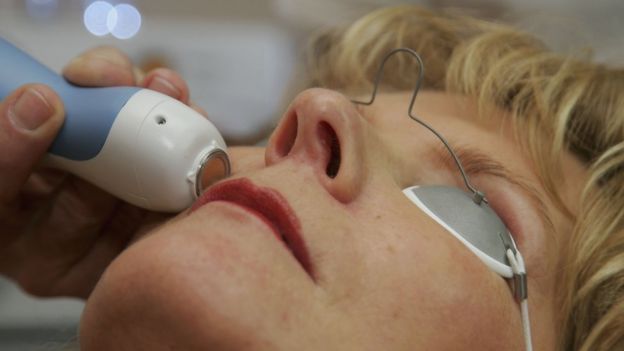 Getty Images
Getty ImagesMore people are asking to have moles removed and it's not just because of concerns about skin cancer. What causes people to feel self-conscious about their beauty marks?
** 기사 요약 및 개인적 소견 **
1. 영국에서도 많은 여성들(10대초반부터 20대초반의 경우)이 자신의 몸에 만족하지 않아 성형수술을 원한다.
2. 셩형수술이 전세계에서 가장 많이 시행되는 4개 나라: 미국, 브라질, 한국. 일본, 한국.
3. 저자는 성형수술을 좋아하지 않는다.
'아름다운 인생 > 건강' 카테고리의 다른 글
(건강) 세계최초로 췌장이식 수술 받은 주사바늘 공포증 환자 (0) 2016.01.29 (건강) 칡뿌리에는 과연 과음과 숙취를 막아주는 효능이 있을까? (0) 2016.01.24 (건강/남미) 남미는 지카 바이러스 때문에 임신도 연기해야 할 판 (0) 2016.01.23 (건강) 수염을 기르는 것은 건강에 좋은가? (0) 2016.01.20 (건강) 심장병 위험 환자에게 혈압약 처방은 환자의 생명 많이 살릴 수 있다. (0) 2015.12.28